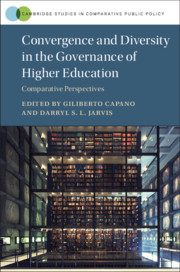3 results
3 - Beyond Matryoshka Governance in the Twenty-First Century: The Curious Case of Northern Ireland
- from Part I - Territorial Pressures in Ireland and the United Kingdom
-
-
- Book:
- The Brexit Challenge for Ireland and the United Kingdom
- Published online:
- 17 August 2021
- Print publication:
- 26 August 2021, pp 64-85
-
- Chapter
- Export citation

Convergence and Diversity in the Governance of Higher Education
- Comparative Perspectives
-
- Published online:
- 21 November 2020
- Print publication:
- 19 November 2020
1 - Theorizing the Governance of Higher Education
- from Part I - Theorizing Governance in Higher Education
-
-
- Book:
- Convergence and Diversity in the Governance of Higher Education
- Published online:
- 21 November 2020
- Print publication:
- 19 November 2020, pp 3-40
-
- Chapter
- Export citation

